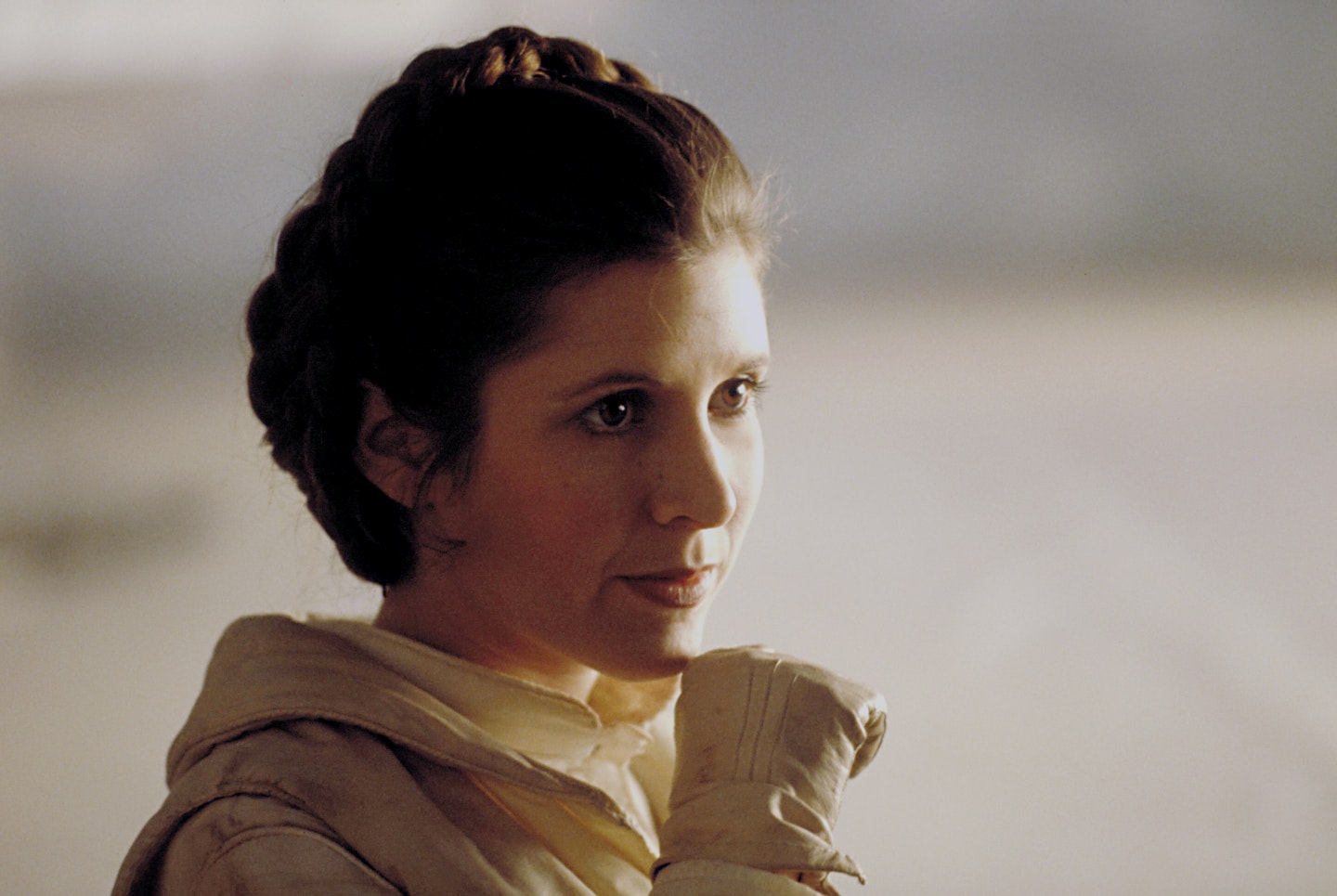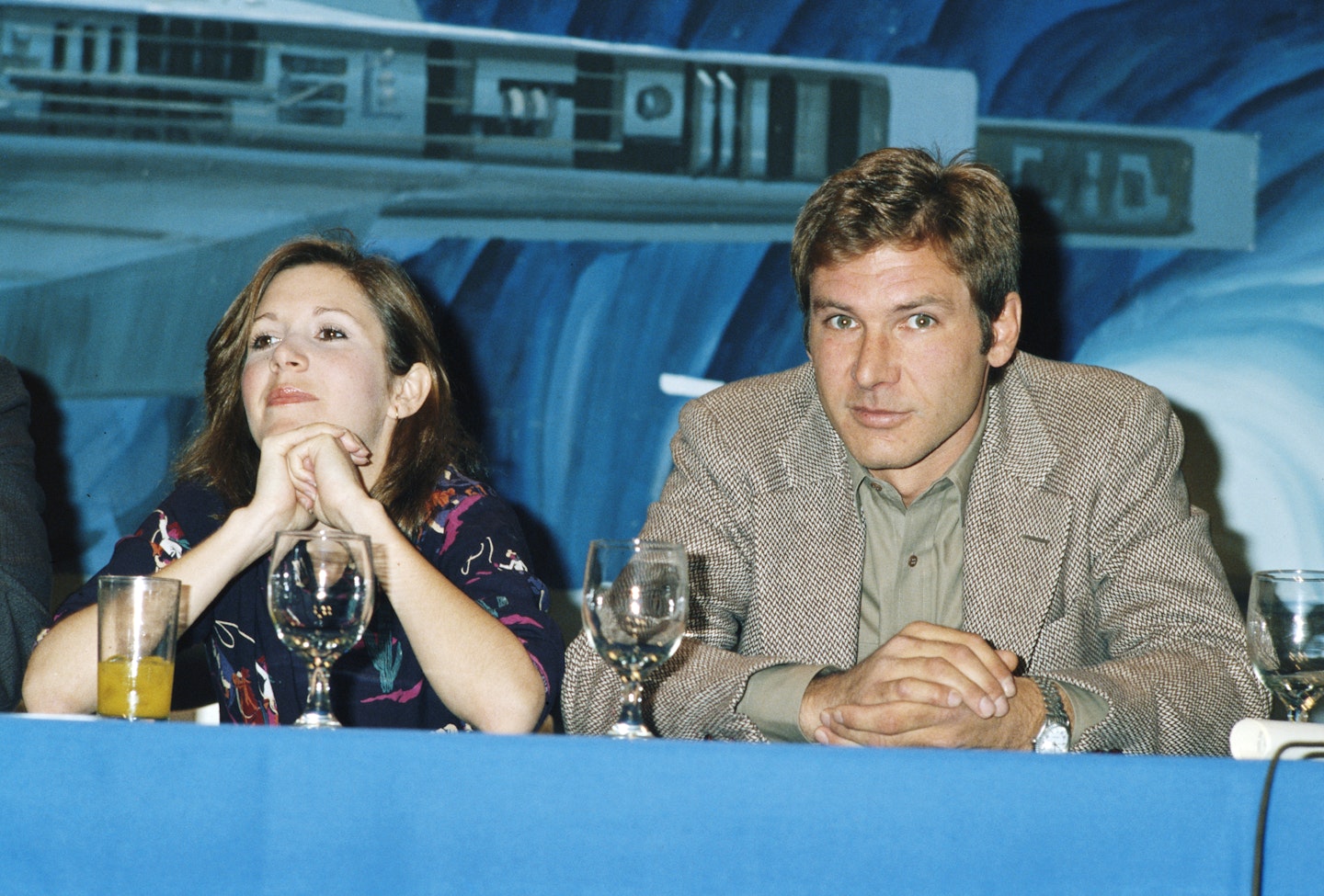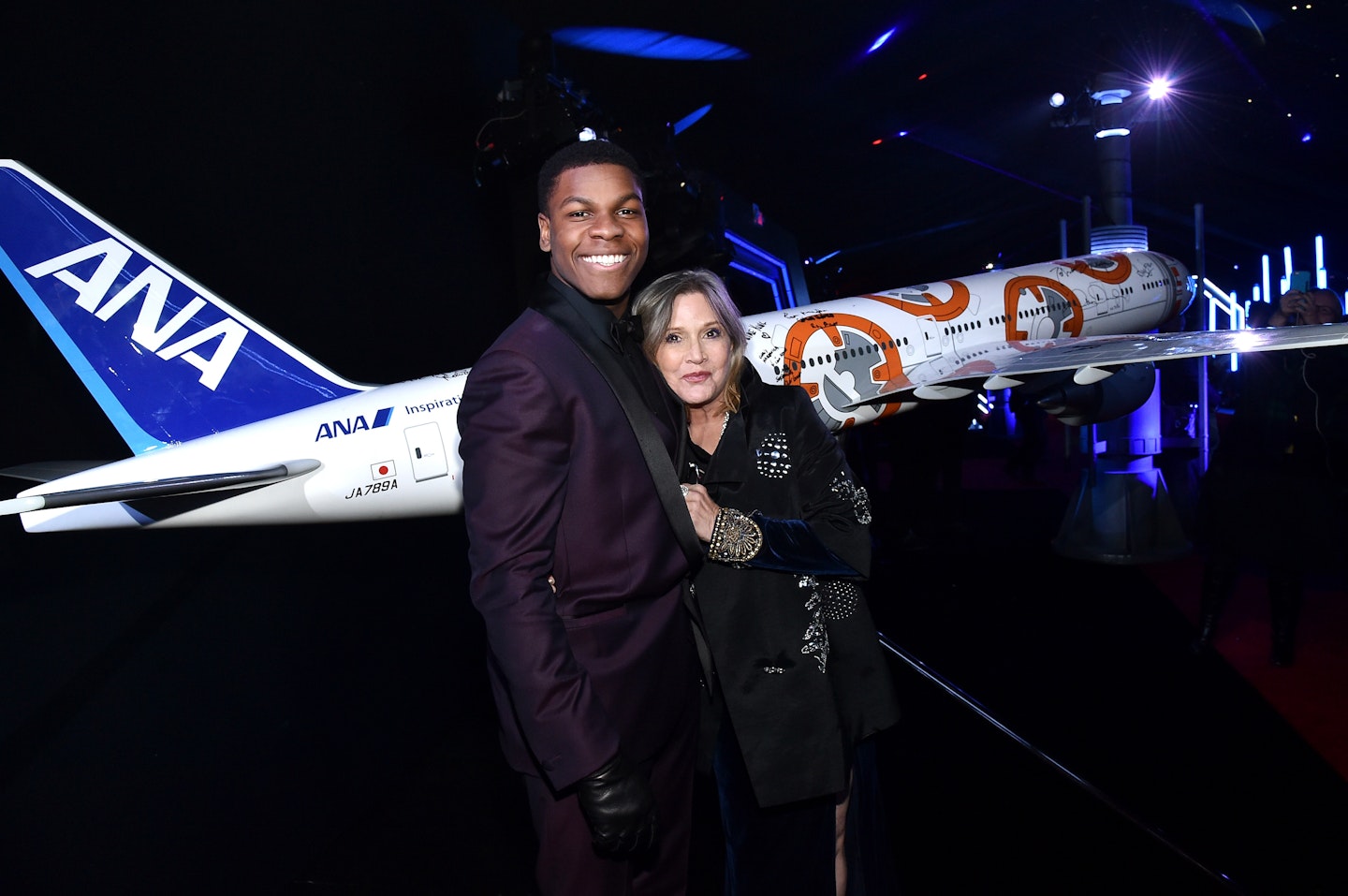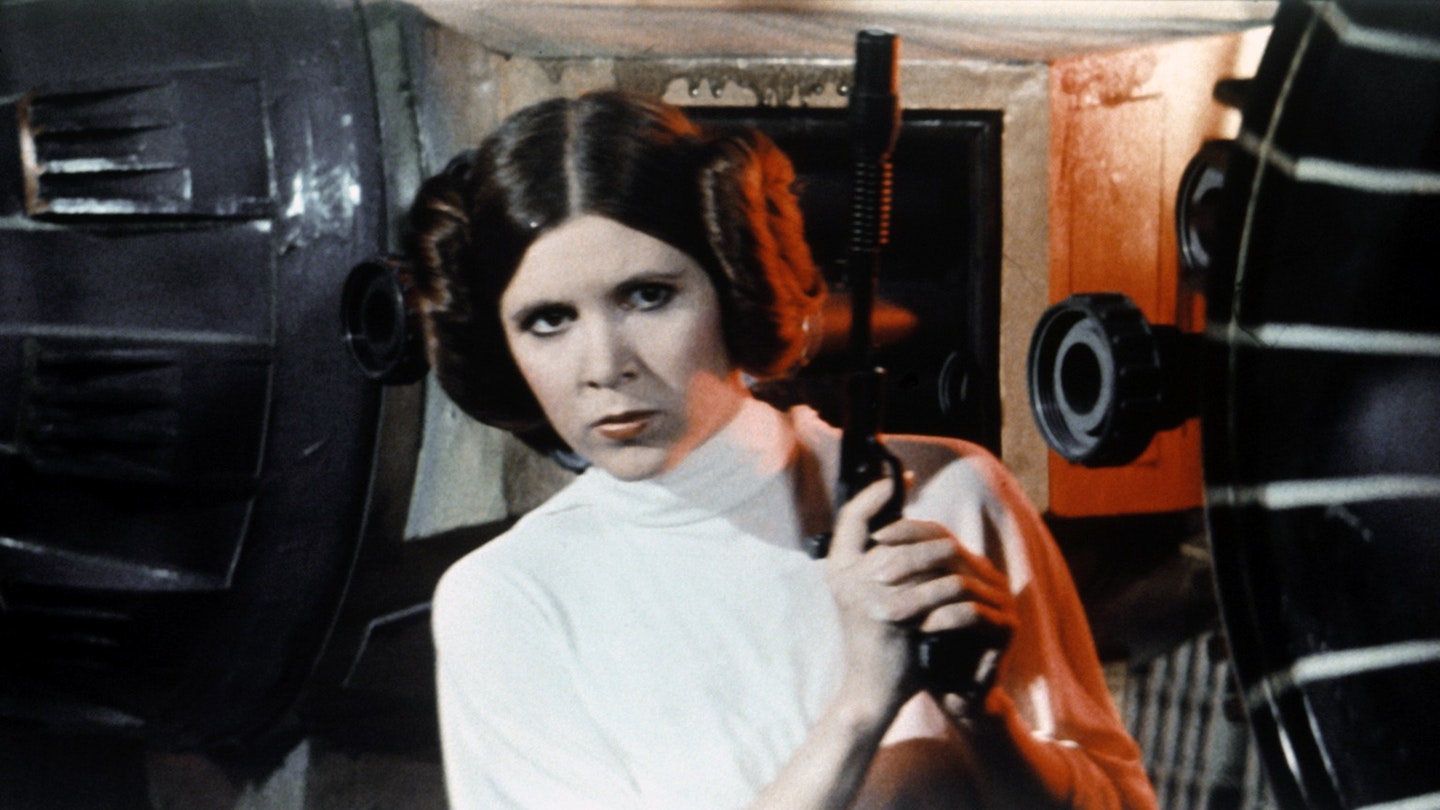We talk a lot about Strong Female Characters now, but before Jennifer Lawrence in The Hunger Games, before the female-led Mad Max: Fury Road cleaned up, and certainly before the newly-minted heroines of the re-booted Star Wars saga, we had Princess Leia – and we had Carrie Fisher bringing her to life.
For nearly forty years, Carrie’s Leia has made feminists of us by stealth. As Kathleen Kennedy (who, as president of Lucasfilm, is now something of a sci-fi heroine herself) put it in a tribute to the actress, who has died aged 60, she ‘defined the female hero of our age over a generation ago.’
The token woman in Star Wars’ intergalactic boys’ club, she showed generations of young girls that they aren’t just placed in the world to sit all in white and be rescued – they can do the rescuing, too. They can be a Rebel leader while wearing the sort of eye-wateringly intricate hairdos that would defy even the most robust YouTube tutorial – and they can certainly cut the boys down to size. As a character, Leia proves herself time and time again: she’s resilient, inspiring, cool.
For many of us, she’s so deeply embedded into our earliest memories, games and ways of thinking that the death of the woman who embodied her feels so strange. In interviews, Carrie often spoke of how, over the years, she’d slowly been absorbed by Leia, and vice versa. Most women and girls who love Star Wars probably feel that they’ve become a little more Leia-like by osmosis, too.

Her Star Wars legacy was far from over. The cast wrapped up work on the as-yet-untitled Episode VIII this summer, with Carrie slated to film the final instalment in 2018; its director Colin Trevorrow spoke of wanting to carve out a larger role for both Leia and her twin brother, Luke. It’s not yet clear how the films will work without her, but we can all agree that they’ll feel her loss immeasurably.
Of course, there was much more to Carrie than that one role. Though she joked that ‘Princess Leia will be on my tombstone’ (and she was often hilariously ambivalent about her legacy of ‘running through corridors’) other parts followed: scene-stealing as Sally’s best friend Marie in When Harry Met Sally, appearances in The Blues Brothers, Hannah and her Sisters, self-deprecating cameos in the likes of 30 Rocks and Sex and the City. Most recently, there came a cantankerous turn as Sharon Horgan’s mother-in-law in Catastrophe (watch out for background cameos from Gary Fisher the Frenchie, her therapy dog and her ‘heart’). You could say that she became adept at playing a self-deprecating version of herself – because really, who could write a better character? Unlike, say, the chameleonic Meryl Streep, who played the lead in Postcards From The Edge, the film adaptation of her semi-autobiographical novel, she positioned herself as ‘more of an archaeologist. I play what I am. I dig what I can.’ Even Leia was ‘a character that’s not too far from myself, except I don’t have any laser guns.’

Bravery and strength aren’t just about wielding those laser guns in a galaxy far, far away. Off-screen, too, Carrie was just as trailblazing and a hero to many: some of whom – gasp – have never seen Star Wars, and have precisely zero intention of doing so. Diagnosed as bi-polar in her mid-twenties, her ubiquity gave her a platform – one which she used to talk openly, honestly and with humour about mental illness, when almost no one else was doing so. On talk-shows, at press conferences, and in her own writing, she explained her condition and spoke about how she treated it in a matter-of-fact refusal to let others paint her as some sort of tragic victim. In 2008’s Wishful Drinking, she wrote that ‘at times, being bi-polar can be an all-consuming challenge, requiring a lot of stamina and even more courage, so if you’re living with this illness and functioning at all, it’s something to be proud of, not ashamed of.’ Speaking out about mental health now is by no means easy, but Carrie’s words helped to start dismantling this stigma on a very public level.
It certainly would have been easier for her to stay as silent and malleable as one of the plastic action figures that stole her likeness, but that wasn’t Carrie’s style. She wouldn’t sit still and shut up: instead, she skewered her industry’s many double standards in an inimitably lacerating style, from the scarcity of roles for older women (‘There are not a lot of choices for women past 27. I don’t wait by the phone’) to Hollywood’s veneration of youth and beauty above all things. When she returned as Leia for Star Wars Episode VII: The Force Awakens, she was guilty of the unthinkable: daring to have grown older in the thirty-odd years since her last space jaunt. Trolls passed judgement upon her face in droves, but her Twitter response (encrypted in the emoji-hieroglyphic system she used for her 140-character missives) was predictably brilliant:
‘Please stop debating about whether or not I aged well. Unfortunately it hurts all three of my feelings. My body hasn’t aged as well as I have […] Youth and beauty are not accomplishments, they’re the temporary, happy by-products of time and / or DNA. Don’t hold your breath for either.’

Carrie was great at Twitter because she had an alchemic way with words, whether she was using that talent for her own books, in her work as an uncredited ‘script doctor’ brought in to sharpen up hits like Hook, The Wedding Singer, Coyote Ugly and – ahem – the Star Wars prequels (OK, there’s only so much that one woman can do) or to gleefully overturn the Hollywood narrative on women, ageing, beauty and mental health in one off-hand remark. As an eloquent and larger-than-life spokesperson for anyone who’s ever felt not quite 'right', her voice was so open, so unashamedly herself that I’m pretty sure it inspired plenty of people to be themselves, too (or at least to do so in their writing). She’s proof that a woman can be many, many things at once – while not taking all of those things entirely seriously – and that you can live a full, brilliant life even if you’re not everyone's ideal of perfect.
The final image of Rogue One, the latest Star Wars spin-off film, is a young Princess Leia, appearing for a moment in uncanny CGI at the darkest point in the story. She says just one word: when asked what the plans she has been handed mean, she answers with ‘Hope.’ It has a happy-sad resonance now, because Carrie – in all her incarnations – gave hope to lots of people. And she always had the last word.
READ MORE: Proof Debbie Reynolds Was Made To Be A Screen Queen
